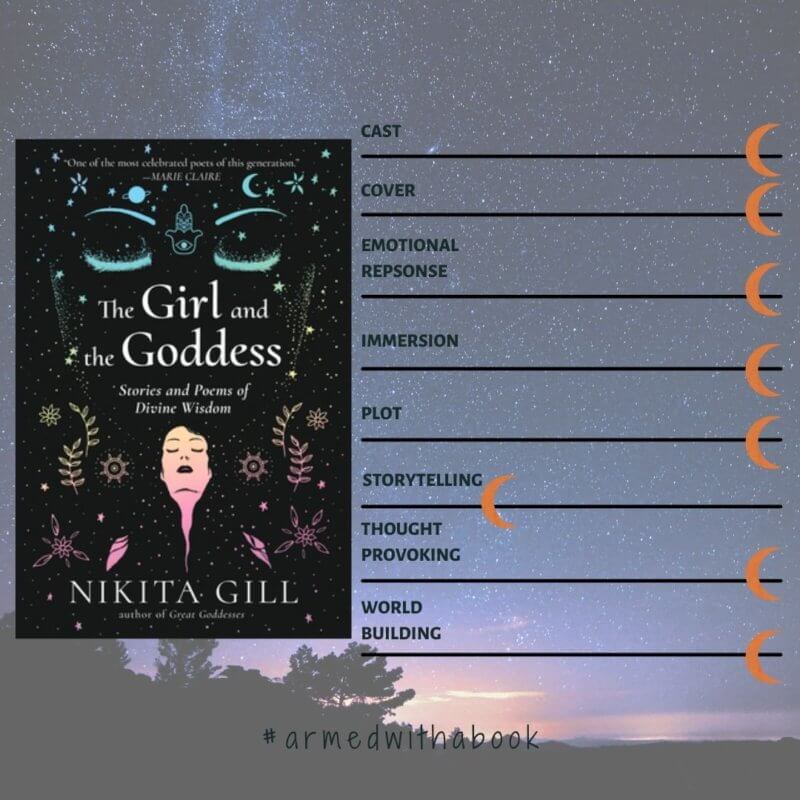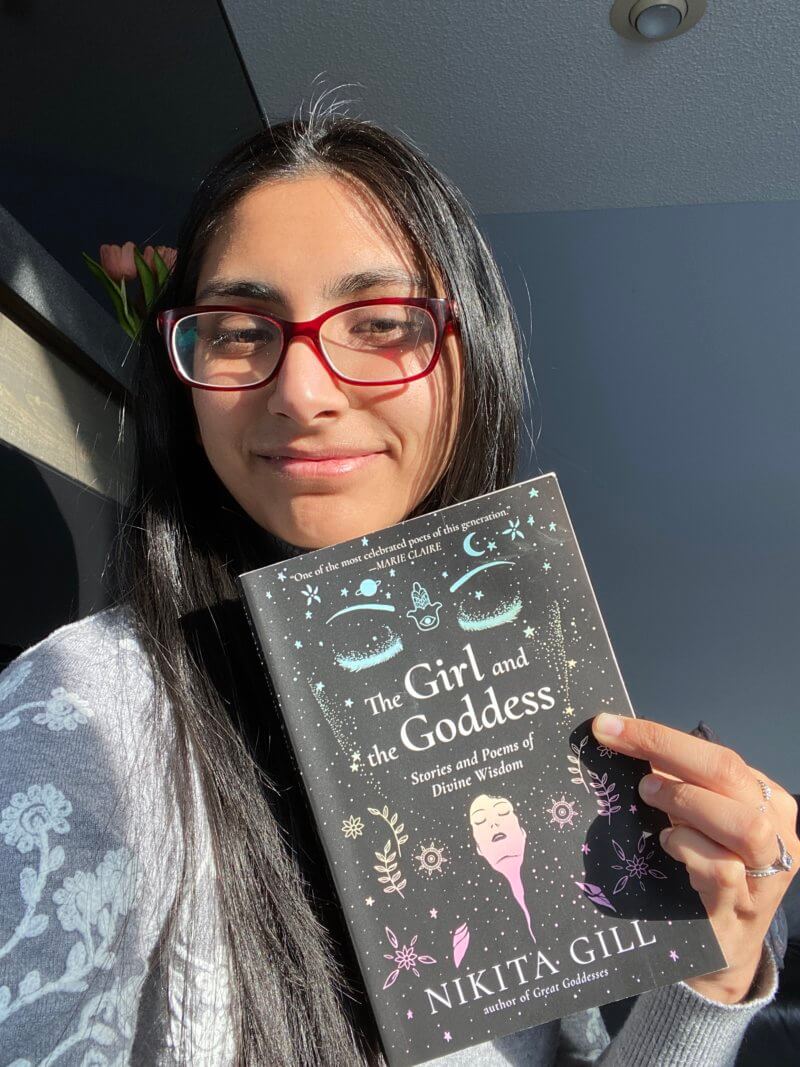While looking for another audiobook to keep me company with my knitting, I decided to look for something that was on my TBR. Nikita Gill’s The Girl and the Goddess – Stories and Poems of Divine Wisdom caught my eye. A short 6 hour read, as I mentioned in last month’s wrap up, I did not realize it would become one of my favorite books of all times, questioning the stories I grew up with as well as reflecting on the life I have had. This is a woman empowering collection of poems and stories from Hindu mythology and Indian history. Take a look at the synopsis below and then read on for my thoughts.

Let her be a little less human, a little more divine
Give her heart armor so it doesn’t break as easily as mine
Meet Paro. A girl with a strong will, a full heart, and much to learn. Born into a family reeling from the ruptures of Partition in India, we follow her as she crosses the precarious lines between childhood, teenage discovery, and realizing her adult self. In the process, Paro must confront fear, desire and the darkest parts of herself in the search for meaning and, ultimately, empowerment.
Nikita Gill’s vivid poetry and beautiful illustrations have captured hearts and imaginations–but in The Girl and the Goddess, she offers us her most personal and deeply felt writing to date: an intimate coming-of-age story told in linked poems that offers a look into the Hindu mythology and rich cultural influences that helped her become the woman she is today.
Content Notes: From the book directly, “characters in this book persevere through anxiety, bigotry, biophobia, body shaming, bullying, child abuse, depression, guilt, homophobia, internalized misogyny, misogyny/sexism, poverty, sexual assualt, terrorism, violence and war.”
Thoughts on The Girl and the Goddess
In this book, I felt understood.
Paro’s life story from the time when she was a young girl to becoming a young woman is one that I could relate to, not just because I am Indian, but also because so much of what she shares in this book is true for all girls and women out there. In Indian society in particular, battling with the notions of a male child being more important and wanted than a female child, confronting the bias for that as well as the societal norms that we grew up through the stories told to us, The Girl and the Goddess challenges and successfully changes the narrative. This book has led me to rethink and reacquaint myself with the women characters who were secondary in Hindu epics of Ramayana and Mahabharat and I will speak more about that in my review of The Palace of Illusions by Chitra Banerjee Divakaruni.
On Personal Truths
From the time she is born, Paro is visited by Hindu goddesses. They come to her at important moments in her life, when she has reached a milestone. Sometimes that milestone is birth and sometimes is an existential crisis of “I wish I was a boy”. Through The Girl and the Goddess, I pondered each of those milestones for myself. I visited my past, saw it through an older lens and then tried to see how the goddess’ stories were relevant and important for those points.
I pondered my relationship with my body, how my view of it has evolved over time, as well as why I allowed certain things to happen, like leaving India and moving to Canada. Maybe when I was younger, it felt like the way life was going to go. Papa had been saying for years to get me to Canada and I internalized those thoughts and went with it. In the last half of the book when Paro leaves for London, in learning why she left, I learned why I left too. I saw the choice I made without realizing back then that it was a choice.
With immersing myself in The Girl and the Goddess, I analyzed my childhood in a way I never have before. The teenage years were the hardest for me to confront through Paro. It breaks my heart to think about how rough life as a girl is. I wish I had been told the stories of these amazing mythological women when I was growing up. There is so much strength to be had! My grandma who often told me stories of queens and princesses would have loved this book.
On Historical Truths
While this book gave me personal jewels, it also opened my eyes to history. The story of partition that I was taught in school was simply this: The Britishers believed India to be too big and hence a potential threat if it was allowed to be as is. Hence, they decided to grant it freedom by splitting into 2 self-governing countries. This eventually became 3 countries, divided on the basis of religion. What The Girl and the Goddess revealed was the years of unrest and how poorly the partition itself was done. It infuriates me every time I think of this. Take a look at the embedded video. It summarizes the religion politics that was ignited long before, sowing the seeds of unrest and paving the way for partition to be the only way to survive:
This really rattled me. I questioned my education. I questioned why the history taught in schools was not more true. Why did we just leave it on 15 August 1947? The fact that the partitioned map was revealed two days after independence… How ridiculous is that and key in showing how little anyone cared about the divide, or maybe the exact opposite – they knew exactly how much mayhem that border line was going to cause and they only caused more destruction by shrouding everything in secrets.
Anyway, I digress for now.
My favorite quotes
I could paste the whole book here really but I would rather you read it. 😀 Here are a few that I loved:
“No wonder they say children can survive anything,
We have not yet looked at life as a thing we can fail.”
Pg 24
What I am trying to say is, it is only through accepting the parts that you are ashamed of that you can truly know yourself.
Pg 104
Paro: How did you learn to figure yourself for all the pain you gave others?
Shashthi: I have not. Forgiveness is easier to give to others than to yourself. But I am slowly learning. Each good deed I do eases some of the evil I once did.
Pg 105
“I did not leave everything I know to go unchallenged”
Pg 120
‘If they cannot have me for who I am
then maybe here is not
where I am meant to be.’
Pg 226

In Paro, I saw myself. Though her life is set around the time of Indian partition, 1947, mine is five decades later, and yet, it is pretty much the same story minus the goddess visits. I never got those visits but after reading this book, I might as well have. It is that empowering and loving an experience. I felt every single goddess’ story is something for me to remember and take inspiration from. Days after finishing this book, I have pondered my relationship to Hinduism and what I believe. I love the stories and will always go back to them because that is the best part about Hindu mythology:
Paro: Why do the Gods and Goddesses reincarnate?
Lakshmi: So that we fulfill our dharma, our cosmic duty. So that we never forget what it is like to be human. The beauty and the tragedy of being mortal is a gift to all, even to the divine.
Pg 123
I loved this book so much that I wanted to take a picture with it. (Brooklyn 99 fans would know Jake’s propensity for taking photos with things he finds dear). And I did.

Will you read it? Add it to your TBR on Goodreads and Storygraph.
Cover image: Photo by Jeremy Thomas on Unsplash

Be First to Comment